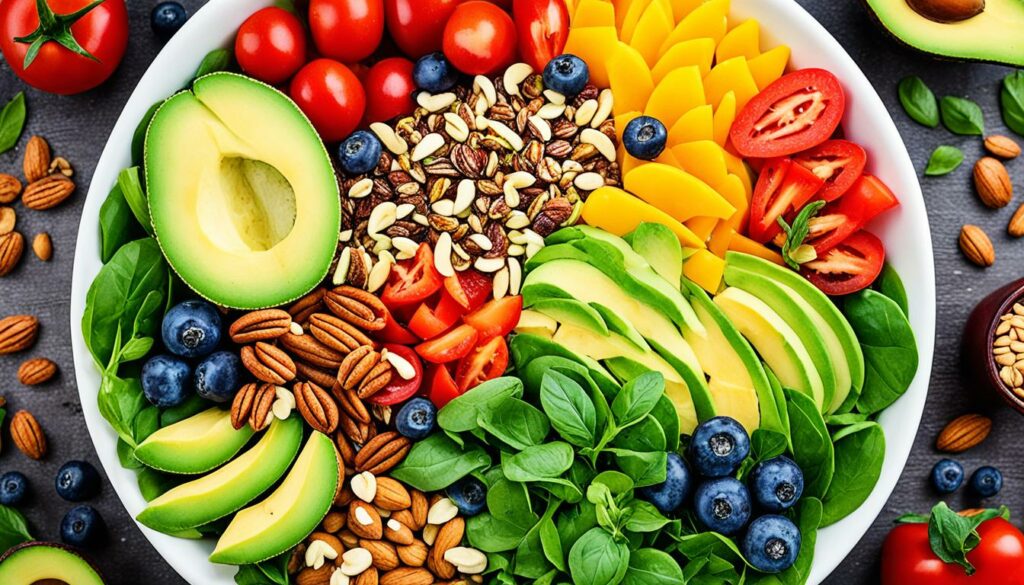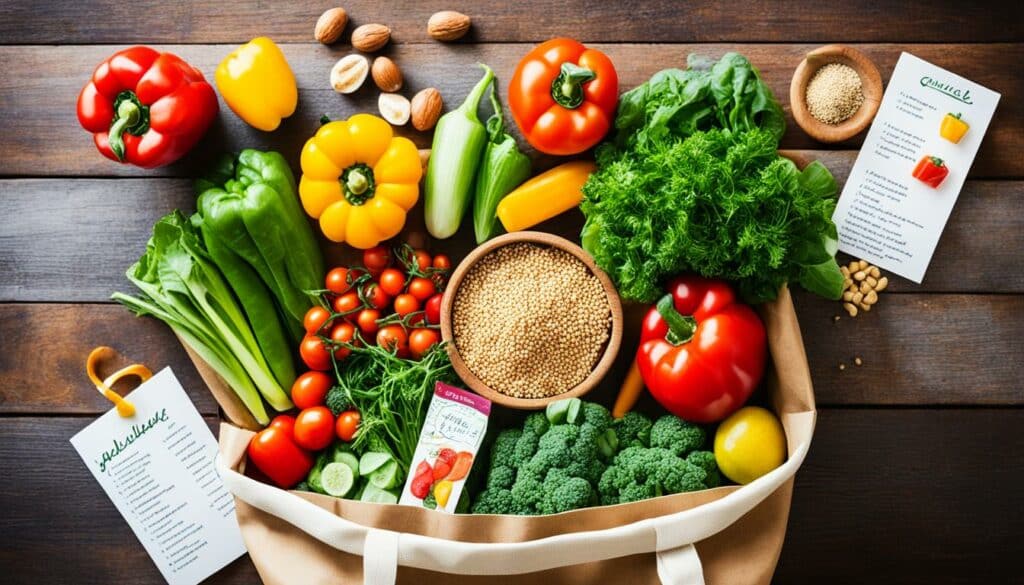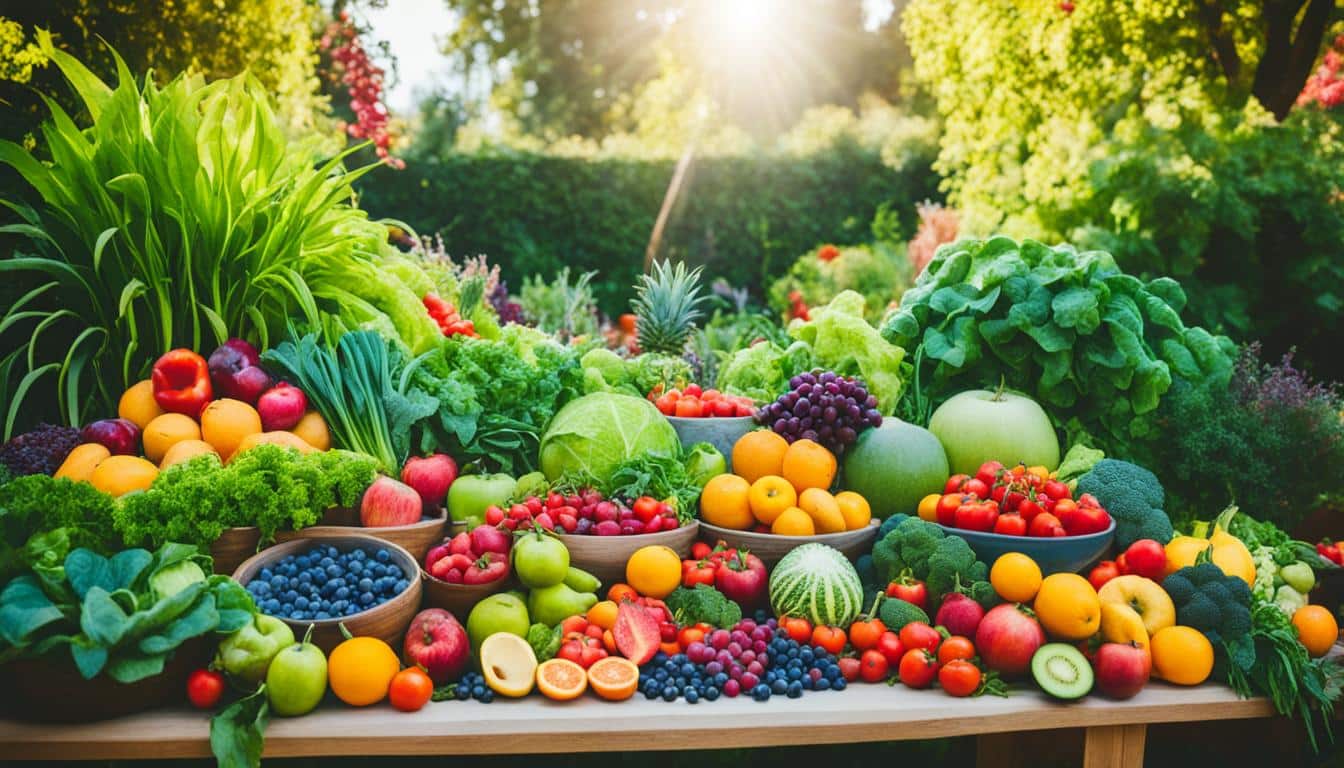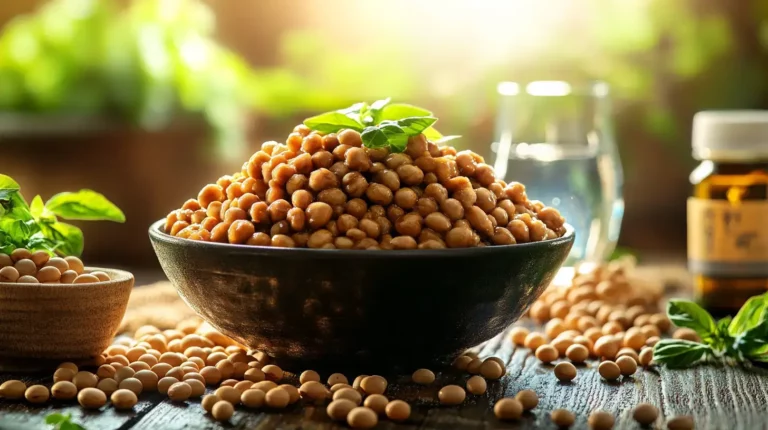The Ultimate Guide to Starting a Plant-Based Diet
Are you drawn to plant-based diets’ increasing fame but unsure how to start? This guide will help you kick off a new, plant-filled lifestyle. It covers all you need to know, from the basic principles to making a smooth change. We’ll make sure you’re ready to begin a plant-based journey that fits your life and wishes.
Key Takeaways
- Discover the numerous health and environmental advantages of a plant-based diet
- Learn the key differences between plant-based diets and other dietary approaches
- Explore practical tips and essential pantry staples to ease your transition
- Uncover strategies to overcome common challenges, from potential detox symptoms to budget concerns
- Gain the confidence and inspiration to embrace a plant-based lifestyle that works for you
Introduction
Recently, the plant-based diet has grown in popularity. This is because it is good for our health and the planet. Studies show it can prevent, manage, and often stop diseases like heart disease and type 2 diabetes. The environmental effect is much smaller than diets heavy in animal products.
A diet full of plants is known to be very good for you. It can help you lose weight, control your blood sugar, and lower your risk of heart problems. In a 16-week study, a diet based on plant proteins greatly improved health in people who were overweight.
Plant diets also help your mind and emotions. Research shows people can get all the nutrients they need from a vegan diet. This counters the idea that these diets can lack important nutrients.
This guide’s goal is to help readers start a plant-based lifestyle successfully. We will define what a plant-based diet is and highlight its many benefits. We will also share tips for starting and overcoming common challenges. Our aim is to encourage and help people on their journey to a healthier, eco-friendly diet.
“Transitioning to a plant-based diet is one of the most impactful lifestyle changes an individual can make to improve their health and reduce their environmental footprint.”
What is a Plant-Based Diet?

A plant-based diet focuses on eating whole, less processed plant foods. This includes fruits, veggies, whole grains, legumes, nuts, and seeds. The key principles of a plant-based diet aim to eat mainly natural foods and to cut back on animal products and processed items.
Plant-based and vegan diets are somewhat alike, but a plant-based diet is not as strict. It really homes in on nutrient-rich, plant-based foods but might still have some items from animals. When compared to vegetarian diets, plant-based diets don’t usually have dairy or eggs. However, Flexitarian diets mix plant and animal foods, leaning more towards plants.
Definition and Key Principles
These are the important things about a plant-based diet:
- It’s built around whole, barely processed plant foods.
- It cuts down on animal products and processed foods.
- It focuses on plant sources that are rich in nutrients.
- It’s big on mixing different fruits, veggies, grains, legumes, nuts, and seeds.
Differences from Other Diets
Plant-based eating differs from other diets in significant ways:
- Plant-based vs. Vegan: Plant-based diets focus on nutrient-rich plant foods, while vegan diets avoid all animal products.
- Plant-based vs. Vegetarian: Vegetarians might eat dairy or eggs, but those are usually off-limits in plant-based diets.
- Plant-based vs. Flexitarian: Flexitarians eat a mix of plant and animal foods but do favor plants.
Even with these differences, the main idea is to eat more whole, less processed plant foods. This is seen as a key for a healthy, eco-friendly diet.
“A plant-based diet can prevent and treat chronic diseases, and most adults can benefit from adopting this way of eating.”
Health Benefits of a Plant-Based Diet
A whole-food, plant-based diet is great for health. It’s excellent for weight loss and management. This diet is often lower in calories but high in fiber. This makes you feel full for longer, helping you eat less.
It’s also good for avoiding chronic conditions like heart disease and type 2 diabetes. By cutting out high-fat animal products and processed foods, it boosts your heart health. It does this by lowering cholesterol and blood pressure. Plus, it makes your body more sensitive to insulin.
Weight Loss and Management
In 2012, over 15% of people in many US areas were obese. A vegan diet without much fat improves blood sugar and heart health in people with diabetes. Eating less meat is linked to lower obesity risk among US adults. Different diets affect weight gain over time in various ways, as shown in a large study.
Managing Chronic Conditions
The type of vegetarian diet you choose affects your weight and diabetes chance, says Tonstad et al. Eating vegetarian helps prevent obesity in kids, according to Sabaté and Wien. Research by Korde et al. found that soy cuts breast cancer risk. It also says soy protein lowers bad cholesterol in people with diabetes, as shown in a study by Pipe et al. Eatin soy foods could help in surviving breast cancer, says Shu et al.
“A 2020 review in Clinical Nutrition found that consuming a vegetarian diet was associated with a reduced risk for negative health outcomes when compared to an omnivorous diet.”
In 2021, a study in Advances in Nutrition showed that a vegetarian diet is great for your heart. It reduces heart disease risk and helps control blood pressure and cholesterol. Another 2021 study in Advances in Nutrition reveals how plant-based diets fight type 2 diabetes. They do this by improving how the body uses insulin and aiding weight loss. They also decrease the risk of heart disease.
- A 2020 study in the Journal of Diabetes Investigation discovered that more fiber from plant foods means a lower diabetes risk.
- Eating lots of fruits, vegetables, legumes, and grains often cuts your cancer risk.
- Plant-based foods fight cancer because they’re full of helpful phytochemicals.
- Research links red and processed meats to a higher cancer risk, especially colorectal cancer.
| Benefit | Key Research Findings |
|---|---|
| Heart Health |
|
| Weight Management |
|
| Cancer Prevention |
|
| Skin, Hair, and Nail Health |
|
| Environmental Impact |
|
There are a few things to keep in mind with a plant-based diet. You should take Vitamin B12 because it’s not in plants. Eating iron-rich plants with vitamin C foods helps your body use the iron better. You don’t have to eat all your plant proteins in one meal, just spread them out over the week.
Getting Started with a Plant-Based Diet

Starting a plant-based diet might seem scary, but it’s also thrilling. With some key steps and must-have foods in your pantry, you can smoothly add more plant foods to your meals. This guide will help make your diet healthier and good for the planet.
Transition Tips and Strategies
It’s smart to take your time with a plant-based diet. Try going without meat one day a week or eating plant meals for most of your day. This slow approach helps your body and taste buds adjust. It makes the change easier and keeps you interested in your meals.
Gradually increasing your plant-based meals is a good idea. Don’t shy away from trying new recipes and ingredients. It keeps your meals fresh and enjoyable.
Essential Pantry Staples
Stock your pantry with these essentials for an easier start:
- A variety of fresh and frozen fruits and vegetables
- Whole grains like quinoa, brown rice, and whole wheat
- Legumes, including beans, lentils, and chickpeas
- Nuts, seeds, and nut butters
- Plant-based proteins such as tofu and tempeh
These ingredients are key for planning and making tasty, plant-based dishes. They are nutrient-rich and will make your meals both satisfying and enjoyable.
Remember, switching to a plant-based diet is a personal journey. Be patient and kind to yourself. Make small changes that you can stick with. Before you know it, you’ll enjoy the many health benefits of a plant-centered lifestyle.
Overcoming Common Challenges

Starting a plant-based diet can be very rewarding. But there are challenges. Your body may react with tiredness, headaches, or stomach problems. These issues are normal. They show that your body is adjusting to a diet without meat and dairy.
Potential Detox Symptoms
Feeling bad at first is okay. These symptoms will lessen over a few weeks. To feel better, drink lots of water, rest well, and add gentle exercise to your routine. With time and effort, your body will adapt, and you’ll see the diet’s benefits.
Addressing Budget Concerns
Some worry that a plant-based diet costs more. But, budgeting well can make it affordable. Use plenty of beans, whole grains, and fresh fruits and veggies. Buying in bulk and preparing meals ahead also save money. Tofu, tempeh, and seitan are good protein sources that won’t break the bank.
Understanding the Disadvantages
A plant-based diet can lack important nutrients. Vitamins B12, calcium, iron, and omega-3s are a concern. Working with a dietitian is smart. They can help you avoid deficiencies and enjoy the health benefits.
With a few smart moves, you can handle the challenges. Stick with it and ask for advice when needed. Plant-based experts and your doctors can offer valuable support.
“Transitioning to a more plant-based diet is attainable without compromising fat loss or muscle gain as long as one monitors calorie intake, focuses on high-fiber foods, and meets a moderate protein goal.”
Conclusion
By switching to a whole-food, plant-based diet, you open doors to great health. You can manage your weight better and prevent many diseases. This lifestyle also helps make the planet greener. This guide has shown you how to start and keep going on this path. With the right info, you can face any common issues. Plus, you’ll enjoy better health, a clear mind, and feel good about your choices.
Recap of Benefits and Tips
Eating mostly plants reduces health risks like heart disease and diabetes. It even makes you less likely to get some cancers. Eating this way helps with keeping a healthy weight and having a sharp mind. The key is to plan your meals well. That means making sure you get all the nutrients you need and avoiding common mistakes.
When you’re ready to change, start slowly. Try new plant-based dishes and get help from friends who are also making this move. This will make it much easier and smoother.
Encouragement to Start the Journey
Start your plant-based lifestyle now. The many benefits are truly rewarding. They go beyond just better health to a cleaner planet. Be open to new food and recipes. This shift will make you feel strong and happy. Choose health and the environment by going plant-based today.
Source Links
- https://www.eatingwell.com/article/7775696/plant-based-diet-for-beginners-your-guide-to-getting-started/ – Plant-Based Diet for Beginners: Your Guide to Getting Started
- https://www.healthline.com/nutrition/plant-based-diet-guide – Whole-Foods, Plant-Based Diet: A Detailed Beginner’s Guide
- https://www.webmd.com/diet/plant-based-diet – Plant-Based Diet Tips for Beginners
- https://www.ncbi.nlm.nih.gov/pmc/articles/PMC8210981/ – A Look at Plant-Based Diets
- https://mcpress.mayoclinic.org/nutrition-fitness/steps-to-start-eating-plant-based/ – How to start a plant-based diet – Mayo Clinic Press
- https://foodinsight.org/what-does-eating-a-plant-based-diet-mean/ – A Simple Guide to Plant-Based Eating – Food Insight
- https://www.cuimc.columbia.edu/news/what-plant-based-diet-and-it-healthy – What is a plant-based diet, and is it healthy?
- https://www.ncbi.nlm.nih.gov/pmc/articles/PMC5466934/ – Definition of a plant-based diet and overview of this special issue
- https://www.ncbi.nlm.nih.gov/pmc/articles/PMC3662288/ – Nutritional Update for Physicians: Plant-Based Diets
- https://www.uhhospitals.org/blog/articles/2023/02/plant-based-nutrition-good-for-you-good-for-the-planet – Plant-Based Nutrition: Good for You, Good for the Planet
- https://hopkinsdiabetesinfo.org/getting-started-on-a-plant-based-diet/ – Getting Started on a Plant-Based Diet – The Johns Hopkins Patient Guide to Diabetes
- https://www.ncbi.nlm.nih.gov/pmc/articles/PMC7912826/ – Foods for Plant-Based Diets: Challenges and Innovations
- https://nunm.edu/2019/04/plant-based-diets/ – Plant-Based Diets: Pros and Cons According to NUNM – National University of Natural Medicine – NUNM


